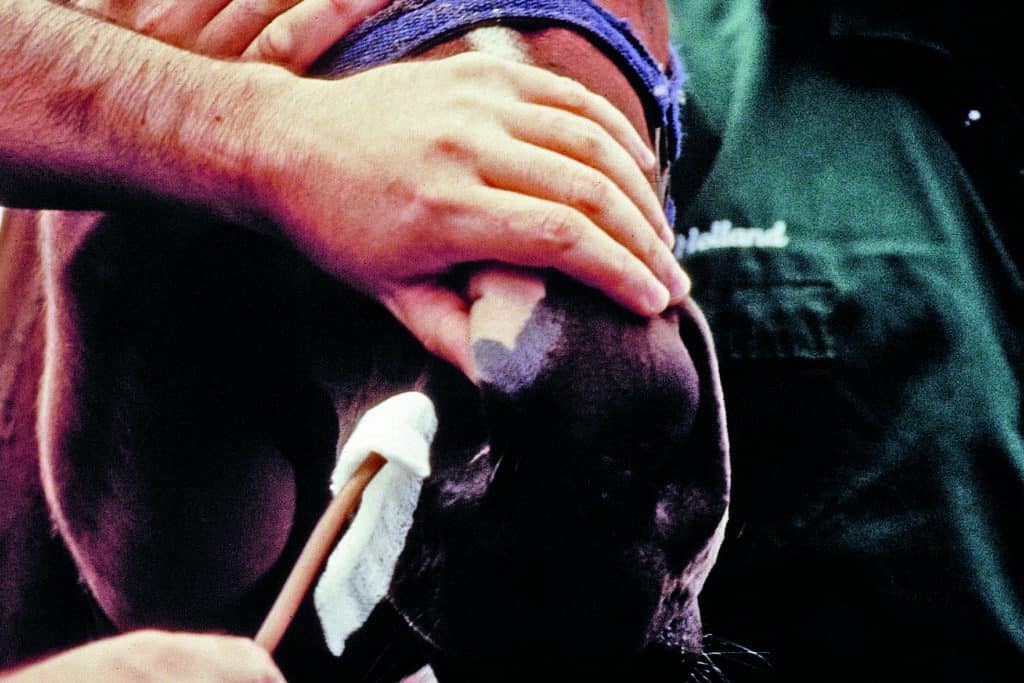Equine Researcher Receives $500,000 Grant to conduct Genome Project
Gluck Equine Research Center’s Dan Howe, PhD, has received a $500,000 grant from the USDA-CSREES Competitive Grants Program to conduct a Sarcocystis neurona genome project.
Horse breeding from planning through foal care
Gluck Equine Research Center’s Dan Howe, PhD, has received a $500,000 grant from the USDA-CSREES Competitive Grants Program to conduct a Sarcocystis neurona genome project.
Established in 1986 as the Horse Bloodtyping Laboratory, the University of Kentucky Animal Genetic Testing and Research Lab (AGTRL) offers a number of testing services of value to practitioners, horse owners, and breed registries.

Recent EHV-1 outbreaks have been alarming in their high neurological attack rate in both vaccinated and unvaccinated horses. Therapeutic intervention with antiviral nucleoside analogs may limit the spread of the virus during an active EHV-1 outbreak while protecting infected horses from the crippling effects of severe neurological disease.
I have a 24-month-old Azteca colt that has dropped only one testicle so far.
These tests will simply be one more tool a breeder can use in addition to advice from bloodstock agents and veterinarians who, in turn, use radiographs, pedigree analyses, and other tools.
Mira, a foal born Aug. 4, runs happily in Binghamton, N.Y., even though her mother died almost a year ago from a ruptured intestine. Her birth was made possible through a team at Cornell that might be among the first to successfully extract and ship eggs from a dead mare for remote fertilization and implantation.
Between May 5 and June 15, the Livestock Disease Diagnostic Center (LDDC) diagnosed 13 foal loss cases caused by mare reproductive loss syndrome (MRLS) in Central Kentucky. This number was up slightly from 2003-2008 when only three to five cases were reported each breeding season.
James MacLeod, VMD, PhD, John S. and Elizabeth A. Knight chair and professor of veterinary science at the Maxwell H. Gluck Equine Research Center and director of UK’s Equine Initiative, was recently awarded two grants totaling more than $1.1 million over three years.
Researchers at the Gluck Equine Research Center will publish a study this fall on contagious equine metritis (CEM), a sexually transmitted disease in horses. Stallions are asymptomatic carriers of Taylorella equigenitalis, the causative agent of CEM, while mares may develop signs of an endometritis/cervicitis/vaginitis following exposure to an infection with this bacterium.
Is it possible genes that become shorter as horses age could be the key to how well that animal’s immune system works?
The Western College of Veterinary Medicine’s Equine Health Research Fund (EHRF) has allocated a total of $69,000 to five new equine health research projects–all of which cover topics of vital importance for researchers and for horse owners.
A 74-page report on equine herpesvirus myeloencephalopathy (EHM), for which equine herpesvirus-1 (EHV-1) has been identified as a causative agent, was released by the USDA Animal and Plant Health Inspection Services, Centers for Epidemiology and
Lactation is a very important function in a mare. So important, in fact, that two lives depend on it. A mare’s body will sacrifice her foal’s health to save her own life … both during gestation and after foaling. In other words, you must feed her
The International Collating Centre, Newmarket, England, and other sources reported the following disease outbreaks:
Contagious equine metritis (CEM) was confirmed on four premises in France. In December 2008, four stallions (three Quarter
Horse transport and housing has an effect on the animals’ stress levels, according to Shannon Garey, a PhD candidate under the direction of Theodore Friend, PhD, PAS, Dipl. ACAABS, of Texas A&M. Garey presented results of an ongoing study on
The mare’s reproductive tract is similar to the respiratory tract in that both have mucosal immune systems. In both areas, the mucosal immune system is capable of producing excessive quantities of mucus when persistently irritated. Robert C.
Stay on top of the most recent Horse Health news with
"*" indicates required fields